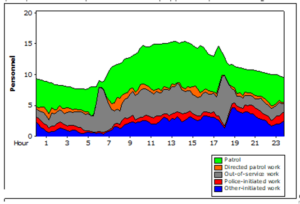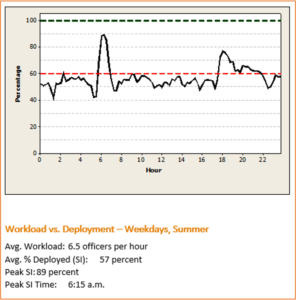The CPSM Approach – Police Operations
We approach our police consulting work as a member of your team. Our subject matter experts will be a team resource – not just for the scope of the project – but during and after when you need questions or assistance.
The CPSM team developed a standardized approach to conducting analyses of police departments by combining the experience sets of dozens of subject matter experts.
 We begin projects with a request for data, documents, and worksheets.
We begin projects with a request for data, documents, and worksheets.
Next, we extract raw data on calls for service from an agency’s computer-aided dispatch system. The data are sorted and analyzed to identify performance indicators (i.e., response times, workload by time, multiple unit dispatching, etc.) for comparison to industry benchmarks.
CPSM also conducts an on-site operational review. Here the performance indicators serve as the basis for the operational reviews.
Additionally, this methodology can be integrated with ongoing support customized to the unique needs of your community. Strategic planning, risk assessment, and training services are also available to assist with the implementation of CPSM recommendations and developing new processes and programs that may arise as implementation evolves.
The following information describes the CPSM approach to studying, understanding, evaluating, and reporting on police departments around the country. Although no two police departments are the same, a standardized approach to department evaluation ensures a rigorous and methodological process that permits benchmarking, comparing, and assessing within the context of the best practices of American law enforcement. However, each locality has unique characteristics that present policing challenges. Integrating a standardized approach within the context of local variability permits an accurate assessment of the organization in its political environment, and further permits CPSM to offer recommendations that comport with the best practices in policing yet customized for the client community.
Benchmark the Community
It is essential to understand the service levels, protection needs, community dynamics, and overall environment within which the police department operates. If necessary, the CPSM study may involve interviews directed at stakeholders in the community, which could include elected officials and employee labor representatives who would be contacted to solicit their opinions about the department, the public safety needs of their constituency, and the perceived gaps in service levels currently provided.
Patrol Operations

 Police agencies routinely speak about “recommended officers per 1,000 population” or a “National Standard” for staffing or comparisons to other municipalities. There are no such standards, nor are there “recommended numbers of “officer per thousand”. The International Association of Chiefs of Police (IACP) states; “Ready-made, universally applicable patrol staffing standards do not exist. Ratios, such as officers-per-thousand population, are totally inappropriate as a basis for staffing decisions.”
Police agencies routinely speak about “recommended officers per 1,000 population” or a “National Standard” for staffing or comparisons to other municipalities. There are no such standards, nor are there “recommended numbers of “officer per thousand”. The International Association of Chiefs of Police (IACP) states; “Ready-made, universally applicable patrol staffing standards do not exist. Ratios, such as officers-per-thousand population, are totally inappropriate as a basis for staffing decisions.”
CPSM’s team of doctoral level experts in Operations Research in Public Safety have created in The CPSM Patrol Workload & Deployment Analysis System© the ability to produce detailed information on workload even in those agencies without sophisticated management information systems. Using the raw data extracted from the police department’s CAD system our team converts calls for service into police services workload and then effectively graphs workload reflecting seasonally, weekday / weekend and time of day variables. Using this information, the police department can contrast actual workload with deployment and identify the amount of discretionary patrol time available (as well as time commitments to other police activities.
The CPSM study will result in the calculation of service demands placed on the department, workload levels, service times for calls for service, and response times.
Investigations
The CPSM study will assess investigations – both reactive and proactive. We will look at staffing, workloads, case management, the effectiveness and efficiency of the investigations section, use of intelligence, opportunities for civilianization and technological opportunities that would improve the outcomes.
Administration and Support
Once again, CPSM will evaluate every administrative and support unit in the police department. This evaluation will involve:
- Staffing;
- Workload;
- Civilianization possibilities;
- Cost saving opportunities;
- Out-sourcing opportunities;
- Best practice comparisons and opportunities for improvement.
Departments across the country are struggling with recruitment, retention, and attracting candidates for sworn positions. We will look at opportunities that the department can use non-sworn personnel for non-criminal activities and keep sworn officers available for calls for service requiring certified officers.
In general, we look at every unit identified as a discrete operational/support entity for the following:
- Describe the functions of the unit;
- Evaluate the performance of the unit. In most cases this is a quantitative; evaluation, but in units not appropriate for quantification, a qualitative evaluation is provided;
- Identification of improvement opportunities
- An evaluation and justification, and recommendation for appropriate staffing levels.
Organizational Culture
During the operational evaluation described above, organizational “themes” emerge. What does the department “think” about providing police service to the community and how does this thinking align with the stated mission and department policies? How does the department interact with the community and internally with its own members? In general, what is the culture of the organization?
Organizational Structure and Administration
Based on the above, we can analyze current management structure and practice and make recommendations to improve organizational administration. The product of this analysis is a proposed staffing mode. The product of this analysis also generally ends up with a leaner, flatter, and more efficient organizational design.
Performance Management
The overarching philosophy of the CPSM approach is to evaluate the police department in terms of performance management. Identifying workload, staffing, and best practices is just the beginning. It is also important to assess the organization’s ability to carry out its mission. Essentially, does the police department know its goals, and how does it know they are being met.
Additionally, this methodology can be integrated with ongoing support customized to the unique needs of your community. Strategic planning, risk assessment, and training services are also available to assist with the implementation of CPSM recommendations and developing new processes and programs that may arise as implementation evolves.
